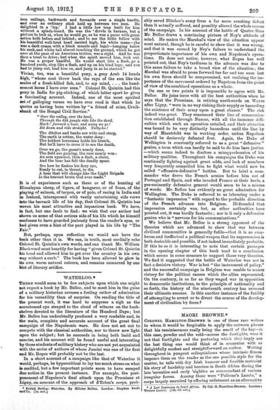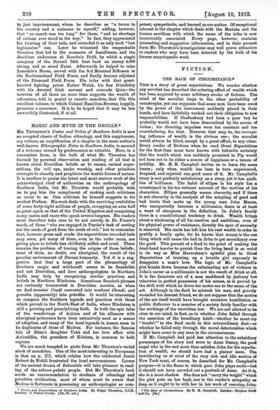MAORI BROWNE.*
COLONEL HAMILTON-BROWNE is one of those rare writers to whom it would be forgivable to apply the outworn phrase that his reminiscences really bring the smell of the hay—in this case, powder and the veld—across the footlights, were it not that footlights and the posturing which they imply are the last thing one would think of in connexion with so delightfully modest and straightforward an author. Writing throughout in pungent colloquialisms whose intrinsic fitness imposes them on the reader as the one possible style for the matter, be tells with dry Irish humour and forcible restraint his story of hardship and heroism in South Africa during the late 'seventies and early 'eighties as commandant of various irregular forces. Among these were " Pulleine's Lambs," a corps largely recruited by offering enlistment as an alternative • A Lost Legionary in South Africa. By Col G. Hamilton-Browne. London: Werner Laurie. [129. 6d. net.]
to just imprisonment, whom he describes as "a terror to the country and a nuisance to myself," adding, however, that "no march was too long" for them, "and no shortage of rations ever stood in the way." In fact, they appreciated his twisting of their tails, and rewarded it as only such "lost legionaries " can. Later he witnessed the unspeakable blunders that led to the massacre of Isandlwana and the deathless endurance at Rourke's Drift, by which a single company of the Second 24th beat back an enemy 4,000 strong, and so saved Natal. Afterwards he helped to raise Lonsdale's Horse, served with the 3rd Mounted Riflemen in the Bechuanaland Field Force, and finally became adjutant of the Diamond Field Force. His talks with that great- hearted fighting priest Father Walsh, his fine friendship with his devoted Irish servant and comrade Quin—the mention of all these no more than suggests the wealth of adventure, told in genial or caustic anecdote, that fills this excellent volume, to which Colonel Hamilton-Browne, happily, promises a successor. It is to be hoped that it may be less unworthily illustrated, if at all.



































 Previous page
Previous page